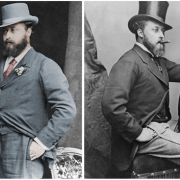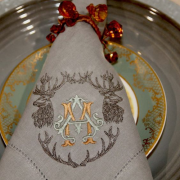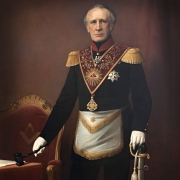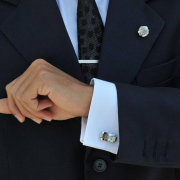Etiquette rules. I have not the slightest doubt that you know these 'rules' or the 'roots' that go with them, but a little background information is always nice.
On the contrary, you, my readers here, who I know to hold even these basics in high esteem. The how and why, I try to make clear.
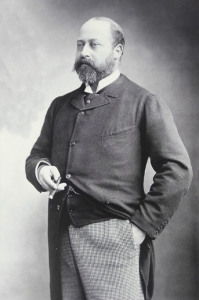
Origin:
When the new men's fashion reached the British royal family shortly after 1900, a problem arose. For the king was too fat. King Edward VII (still Prince of Wales in the early 1900s) was a real bon vivant.
He ate every day, hold on: a hearty breakfast; full lunch; tea with sandwiches and scones; dinner of twelve courses and a late supper. And on top of that, His Highness smoked 12 enormous cigars and 20 cigarettes a day.
Of course, to keep the digestion going. That is why he did not fit well in his jacket. It squeezed around his belly, and not just when he was sitting down. Edward decided to leave the bottom button of his waistcoat open. That way he could comfortably keep up with the fashion of the moment.
The High Society was often on horseback. When fashion changed and the jacket became part of the costume, King Edward thought that one thing should be kept from the old look. The jacket had to fall open at the bottom, as if you could get on a horse with it. That is why the king always left the bottom button open. So that open bottom button is an homage to the riding jacket. Edward undid the top button because it looked careless and nonchalant.
The High Society followed the king. Out of respect and perhaps also because it was more comfortable. This had a global impact. For the British Empire was at that time the largest empire of all time with a population of over 450 million people.
So what about today?
Well, this old habit has become a standard vestimentary rule. Not only at the level of etiquette, but also in contemporary fashion.
And, very importantly, we admit it, it is also much more comfortable.
Keeping the door open.
Origin:
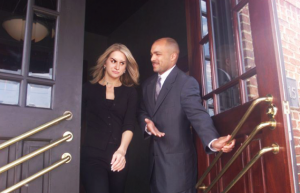
It was also a question of not making the people behind wait too long. Since these were ladies of standing, this custom soon became associated with the upper class, and thus with well-bred gentlemen. It soon became synonymous with well-bredness. And now, long after the times of hooped skirts and corsets, it is simply seen as a sign of politeness and 'decorum'.
So what about today?
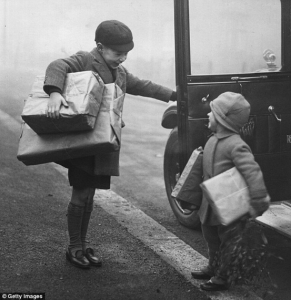
I suppose she thinks so herself. For which she has every respect, although she could have made it clear in another way. However, I experienced it as a pitiful expression of a ridiculous urge to confirm.
After all, it is better to regard it, not as an outdated custom, but as a non-gender-laden gesture of courtesy. Not just towards women or the elderly, but towards everyone. Just a courteous gesture to everyone. In case it is not appreciated by the other party, too bad for them, just smile and go on with your day. In 9 out of 10 cases, the gesture will be appreciated.
This gesture is also valid for opening the door of a carriage, car or automobile.
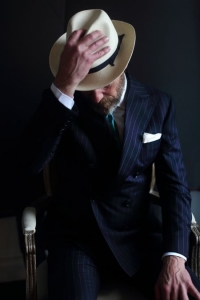
Origin:
In earlier days, men wore hats, other types of headdress and armour to protect themselves not only from the natural elements, but also from (potential) enemies. This head-dress was taken off indoors as a sign of trust (we are friends), and also to ensure that outside influences, such as rain, snow, leaves etc, would not fall on other people or meals.
Headgear is also removed at medal ceremonies and when a funeral procession passes by. A hat is worn as a fashion statement, but mainly as protection for your head against the natural elements. If you do not remove your hat indoors, it may be considered offensive by the host.
Sometimes a headgear can make it difficult to see your eyes, or it can cast a shadow on them. That does not look very neat. In the past, you were always asked to remove your hoof because some people hid their weapon on their head in that hat.
What about today?
Just like in times gone by, it shows respect for the place and host or hostess where you are received. Besides, you don't need protection from 'the elements' inside someone's house!
Putting the chair in front of a lady.
Origin:
Just like opening a door for a lady, the origin is to be found in the necessary helping of a lady (of 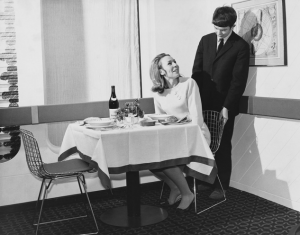
No more or less. Of course, there is also the theory that in this way, the lady could always see the entrance, and thus notice an incoming threat first.
So what about today?
And again, we have to move away from the commonly accepted that this gesture screams: 'I am only doing this because you need my help'.
The fact that you let a lady sit down first, be it your mother, sister, daughter or partner, only shows that you care about their welfare and comfort.
You give it priority over your own, which is a form of respect. It also gives you the opportunity to give your 'date' the best view.
Raphaël van den Poel, former fashion consultant of Scapa, Reinhard Frans and Atelier NA tailored suits,
writes our weekly blog on gentleman matters. He works for MYX Magazine, a Flemish luxury lifestyle platform.
He also has his own blog which you can read here: http://belgiandandy.blogspot.com

